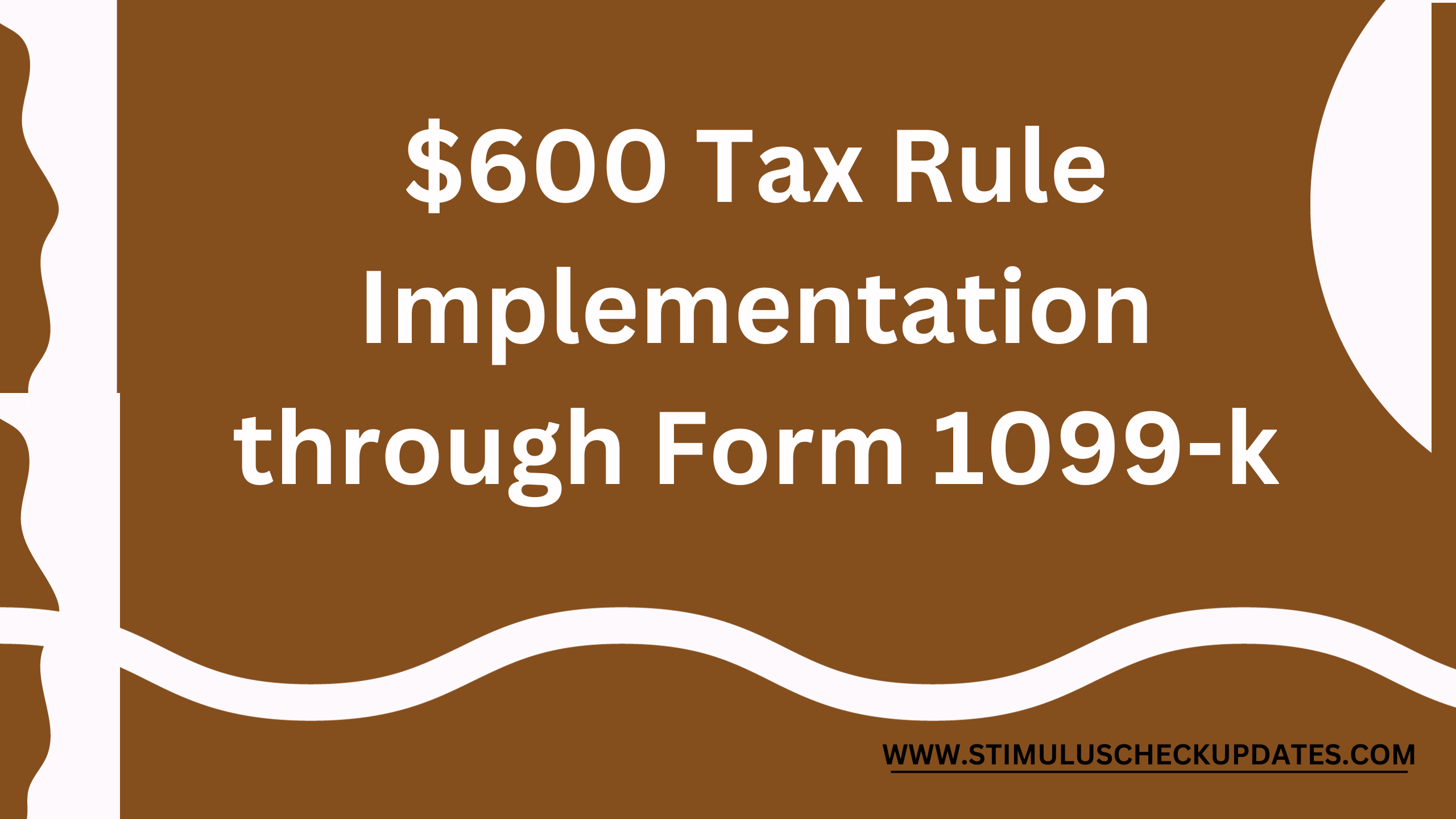Get ready for a financial update: Next year brings changes to the $600 Tax Rule. We’ll explore Form 1099-K, breaking down what it means for your money. Discover how these alterations will affect your transactions and get prepared for smoother financial reporting. Stay informed as we uncover the implications and offer insights to navigate these upcoming tax changes effortlessly.
$600 Tax Rule 2024 Overview
| Category | Details |
| Update | $600 Tax Rule |
| country | USA |
| organization | Internal Revenue Services |
| Rule Implementation Day | 1ST Jan 2024 |
| Effective date
|
January 1, 2023 |
| Reporting period
|
Calendar year 2023 |
| Forms issued
|
Early 2024 |
| Returns due | April 15, 2024 (or extended due date)
|
| Official website | irs.gov |
What is the new IRS $600 Tax Rule 2024
Starting in 2024, the IRS will require third-party payment processors and other businesses to report transactions of $600 or more to the IRS on Form 1099-K. Currently, businesses only have to report if the annual transactions exceed $20,000.
This new lower threshold means many small businesses and self-employed individuals will now have to report more of their business income to the IRS. Payments processed by companies like PayPal, Venmo, and Cash App will be within the scope of this new reporting rule.
Experts say this change will help the IRS catch tax evaders and reduce the tax gap. However, some small business owners worry this added reporting burden will increase their costs and be an unnecessary hassle. Proper record keeping will help ensure all income is accurately reported.
IRS Launches Exclusive IRA and CHIPS Pre-filing Registration Tool for Organizations
What is a Form 1099-K?
A Form 1099-K, also known as a Payment Card and Third Party Network Transactions report is an informational tax form used by payment settlement entities (PSEs) to report certain payment transactions to the IRS. It reports gross payment volume from all reportable payment transactions made to a taxpayer during a calendar year.
PSEs include banks and third-party payment processors like PayPal and Stripe. They are required to file a Form 1099-K if a merchant’s gross payment volume from all reportable transactions exceeds $600 for the calendar year. Reportable transactions include sales made through payment cards, third-party networks, and other electronic means. Transactions that don’t use these payment methods, like cash and check payments, are not reported on a 1099-K.
The information reported on a 1099-K includes the merchant’s name, taxpayer identification number (TIN) or social security number (SSN), address and gross payment volume. This helps the IRS verify if merchants are properly reporting all of their business income on their tax returns. If the reported amounts don’t match, it could trigger an audit.
$600 Tax Rule Implementation through Form 1099-K
The new $600 IRS tax reporting rule will be implemented through Form 1099-K filings starting in the 2023 tax year. Previously, payment settlement entities only had to file a 1099-K and provide a copy to merchants if their annual gross payment volume exceeded $20,000 and they processed over 200 separate payment transactions.
For 2023, the IRS has lowered these thresholds to match the new $600 tax rule. Now, any merchant whose gross payment volume from all reportable electronic payment transactions exceeds $600 for the calendar year, regardless of transaction volume, will receive a 1099-K.
This means many more small business owners and independent contractors will start receiving a 1099-K in early 2024 reporting their 2023 payment transaction activity to the IRS. The information on the 1099-K forms must then be included with their 2023 tax returns. Failure to properly report all income could result in audit penalties if the 1099-K amounts don’t match their tax filings.
What does this mean for you and your money?
For many small sole proprietors, independent contractors, and freelancers, the new $600 reporting threshold will mean they need to be more diligent about tracking all business income and expenses to avoid issues when filing their 2023 tax return. Some key impacts include:
- Proper record-keeping is critical. Anyone receiving a 1099-K will need to ensure they have documentation of all income, expenses, and deductions to back up their tax filings. Sloppy bookkeeping could trigger an audit.
- Increased tax compliance. To avoid penalties, self-employed individuals and small businesses will need to properly report all income received, not just amounts over $600. Failing to do so is considered tax evasion.
- Potential for higher tax bills. With more income being reported to the IRS, it’s possible some may owe more in self-employment taxes or have higher taxable income that pushes them into a higher bracket. Proper deductions and credits can help offset this.
- Need for quarterly estimated tax payments. Those with income reported on a 1099-K may need to start making quarterly estimated tax payments to avoid underpayment penalties from the IRS.
- Importance of record retention. Documentation should be kept for at least 7 years in case the IRS wants to review transactions in an audit. This long-term record-keeping is now more critical.
When will the $600 Tax Rule Be Implemented?
The new $600 tax reporting threshold takes effect on January 1, 2023. This means payment settlement entities like banks and payment processors will begin reporting gross payment volumes over $600 on Form 1099-K for the 2023 tax year.
These forms will be issued in early 2024, allowing taxpayers time to receive them and include the reported income on their 2023 tax returns, which are due by April 15, 2024 for most individuals.
- Effective date: January 1, 2023
- Reporting period: Calendar year 2023
- Forms issued: Early 2024
- Returns due: April 15, 2024 (or extended due date)
This gives self-employed individuals and small businesses just over a year to adjust their operations and record-keeping to comply with the new lower $600 income reporting threshold. Proper planning and accounting now can help avoid issues when filing 2023 returns next spring.
What is the $600 tax threshold for 2023?
- The threshold for Form 1099-K reporting is lowered from $20,000/200 transactions to $600 of gross payments.
- Any merchant receiving over $600 in reportable electronic payments in 2023 will get a 1099-K.
- Reportable transactions include those made by credit/debit cards, PayPal, Venmo, etc. through payment processors.
- Cash and check transactions are not included in the $600 threshold amount.
- 1099-K forms will be issued in early 2024 covering the 2023 tax year.
- Income reported on 1099-Ks must be included on 2023 tax returns due by April 2024.
- Failure to report all income could result in audit and penalties if 1099-K amounts don’t match returns.
Bottom line
the new $600 threshold applies to gross payment volumes from electronic payment transactions as reported on Form 1099-K for the 2023 tax year. Proper recordkeeping and compliance are critical for those receiving even small amounts through these payment methods.
FAQs – IRS $600 Tax Rule Changes:
What is Form 1099-K, and How Does it Affect Me?
Form 1099-K is an IRS form used by payment settlement entities (PSEs) to report payment transactions to the IRS. If your gross payment volume from electronic transactions exceeds $600 in a calendar year, you will receive a 1099-K. PSEs include banks and payment processors like PayPal.
How Will the $600 Tax Rule Affect Small Businesses and Self-Employed Individuals?
The new threshold means more small businesses and self-employed individuals will need to report their income. Proper record-keeping is crucial, as failing to report income accurately could result in audits and penalties. Increased diligence is required for income, expenses, and deductions.
When Will the $600 Tax Rule Be Implemented, and When Are Forms Issued?
The new reporting threshold starts on January 1, 2023. Forms 1099-K will be issued in early 2024, covering the 2023 tax year. Tax returns, including the reported income, are due by April 15, 2024, for most individuals.
What are the Key Impacts and Considerations for Taxpayers?
Proper record-keeping is critical to avoid audits. With more income reported, self-employed individuals may face higher tax bills and may need to make quarterly estimated tax payments. Long-term record retention of at least 7 years is now essential for transaction reviews in potential audits.
Prepare now for these changes to ensure smooth financial reporting and compliance with the new $600 IRS tax rule

